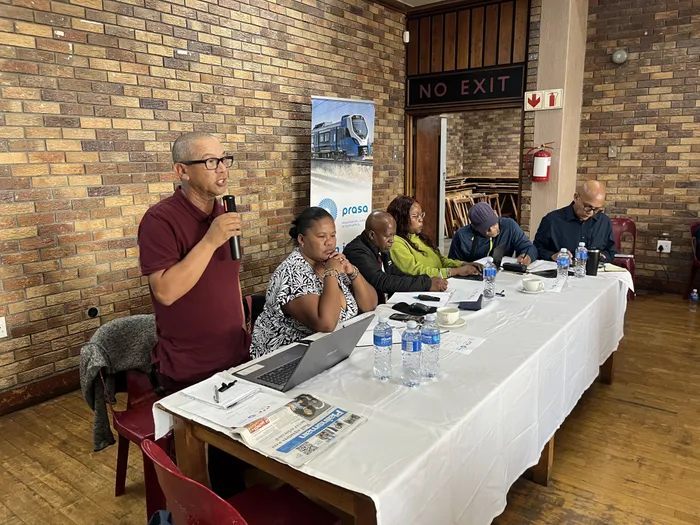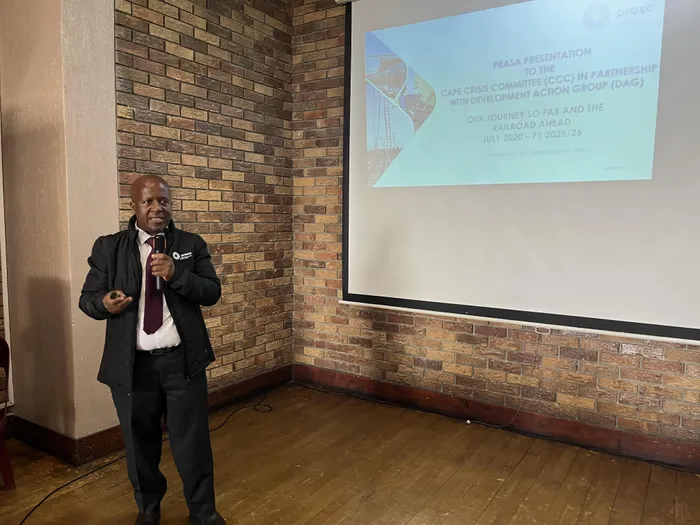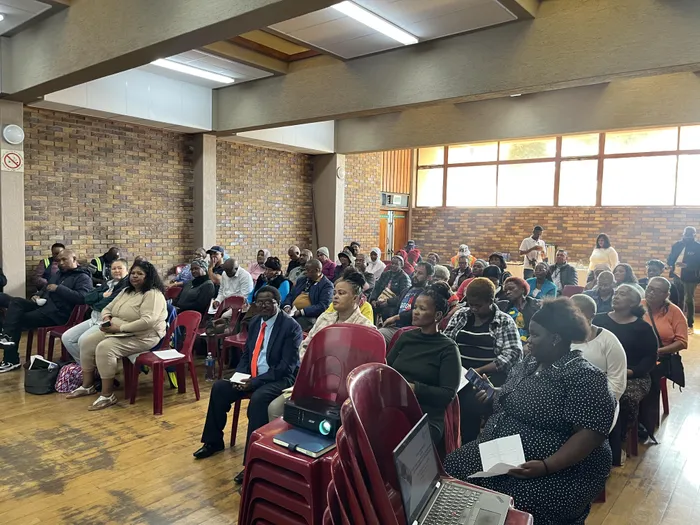Central line to be up and running by the end of June, says Prasa

From left are Mitchell's Plain Residents' Association (MURA) deputy chairperson, Michael Jacobs, Cape Crisis Committee chairperson, Latifah Jacobs,Passenger Rail Agency of South Africa (PRASA) Metrorail Western Cape regional manager, Raymond Maseko, Development Action Group project officer, Vuyokazi Hlwatika, Cape Crisis Committee member, David Abrahams and Cape Crisis Committee member, Dr Llewellyn MacMaster.
Image: Marsha Bothma
Trains will officially return to Cape Town’s central line by the end of June, according to the Passenger Rail Agency of South Africa (PRASA) Metrorail Western Cape regional manager, Raymond Maseko.
Mr Maseko was speaking at a meeting hosted by the Cape Crisis Committee (CCC) in partnership with the Development Action Group (DAG) on Wednesday April 9 at the Athlone civic centre.
PRASA presented its progress, addressed public concerns, and outlined timelines for the long-awaited recovery of rail services in the Western Cape.
Mr Maseko said the central line, once a vital lifeline for thousands of daily commuters, collapsed in 2015 amid governance failures. This was followed by widespread vandalism and further setbacks during the Covid-19 lockdown (“Rail 'squatters were never relocated'", Plainsman, April 1; "'Prasa relocation illegal'", Plainsman, January 31 2024; and "Plain train line on track", Plainsman, May 15 2024).
At the time, the Western Cape had 124 operational stations. After lockdown, only 13 remained, with train services reduced to the Cape Town – Retreat route.
“The collapse was accompanied by widespread vandalism and theft,” said Mr Maseko. “In Bonteheuwel and Mitchell’s Plain, stations were stripped bare. PRASA staff faced extortion and violence. Work in areas like Heideveld and Philippi had to stop for safety reasons.”
Despite the turmoil, Mr Maseko said PRASA has managed to restore access to 121 of the original 124 stations. Bonteheuwel station is expected to reopen before the end of April. Electrification work is ongoing on the Kapteinsklip line, and trains from Kapteinsklip to Cape Town are scheduled to resume operation by Tuesday July 1.

Passenger Rail Agency of South Africa (PRASA) Metrorail Western Cape regional manager, Raymond Maseko, said Bonteheuwel station is expected to reopen before the end of April. Electrification work is ongoing on the Kapteinsklip line, and trains from Kapteinsklip to Cape Town are scheduled to resume operation by the end of June.
Image: Marsha Bothma
Progress in certain areas has proven especially complex. “In Langa, 1 262 homes were built on the tracks,” said Mr Maseko. “Since 2020, we’ve been working through an Implementation Protocol with various government departments to secure land and relocate the affected communities.”
However, similar efforts in Philippi were derailed by violence and crime during relocation talks with informal settlement representatives. Security concerns continue to dominate the discussion, particularly between Philippi and Lentegeur.
“Extortion syndicates have targeted our contractors,” Mr Maseko said. He said PRASA has since introduced a layered security approach, which includes outer and inner patrols, static guards at stations, mobile guards on trains, and fencing along railway boundaries. Community-based Crime Prevention Forums (CPFs) are also part of the security strategy.
PRASA has introduced new blue trains to replace the older yellow models. These upgraded trains feature CCTV surveillance, door sensors, and onboard alarms, with visible security personnel deployed for passenger safety.

The meeting was hosted by the Cape Crisis Committee (CCC) in partnership with the Development Action Group (DAG) on Wednesday April 9 at the Athlone civic centre.
Image: Marsha Bothma
But while the safety of the new trains was acknowledged, some attendees raised accessibility concerns.
Gillian Moses of Disabled People South Africa (DPSA) said the blue trains are not inclusive. “The trains are safe, but they’re not accessible. We want to use them too,” she said. DPSA highlighted gaps between platforms and train doors, and called for full compliance with universal design standards.
Work continues on the lines from Cape Town to Bellville (via Sarepta), and further to Nyanga.
Mr Maseko said long-distance routes are also being revived, though delays due to theft and corruption persist.
Train frequency currently stands at one every 20 to 30 minutes, but PRASA aims to reduce this to a 10 to 15 minute interval.
Mr Maseko promised transparency moving forward.
CCC chairperson Latifah Jacobs urged PRASA to listen to the communities affected.
"Work with us, not around us. The central line is about more than transport — it’s about dignity, access, and economic survival for our people.”
Michael Jacobs, deputy chairperson of the Mitchell’s Plain United Residents' Association (MURA), said the train crisis highlighted during the taxi strike showed how deeply communities suffer. “A train ticket costs R9, but at peak hour, buses and taxis cost R42. We all carry some responsibility, but those tasked with delivery must act. Delays are unacceptable — our families are paying the price.”
Closing the meeting, David Abrahams of CCC added: “We will hold you accountable. But we’re here because we care — and we’re saying, work with us.”
Related Topics: